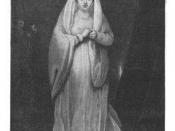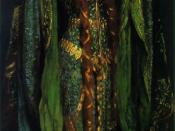In Shakespeare's Macbeth, the lead character, Macbeth, is presented with a choice of right or wrong. The wrong choice was made, and the outcome ended in tragedy. The murder's Macbeth commits lead to his loss of morals and his soul. The first murder was thought out, yet as the play developed Macbeth began to kill on impulse. This lack of judgment is what led Macbeth to his inevitable downfall.
Before Macbeth killed Duncan, his beliefs and morals were very strong. He was known as heroic and patriotic towards his country. His feelings toward the king were as strong as his feelings for his country. He respected king Duncan and king Duncan felt the same towards Macbeth. Throughout the first act, it is clearly shown that Macbeth is an honest, noble, valiant, and dependable warrior, these are descriptions of Macbeth made by the soldier, Duncan and Lady Macbeth.
"Doubtful it stood...
upon our battlements" (Act 1, Scene 2 L9-25) "O valiant cousin! Worthy gentleman" (Act 1, Scene 2 L26) "Yet do I fear thy nature; It is too full o' milk of human kindness" (Act 1 Scene 5 L15) Macbeth wrote to Lady Macbeth to tell of the witch's prophecies that, if true, may change her title queen of Scotland. Lady Macbeth then started to plan to kill Duncan to make her title true. Macbeth had a lot of trouble with the idea of killing the king. Macbeth really wanted to be king, but did not want to have to kill for the title. Macbeth went through all the consequences that killing Duncan would result in and came to the conclusion not to do it at first. His thoughts changed after Lady Macbeth gave him answers to all his questions of judgment after death, or during life, his duties as a subject to the king, Duncan's virtues and how the people of Scotland would react. This made him confident in the choice to kill Duncan and take his title of king and make it his own.
After Macbeth kills king Duncan, he lost all morals he had and therefore he loses his soul. After the murder, Macbeth changes dramatically. Immediately after, Macbeth and Lady Macbeth discuss the apparitions, hallucination and nightmares they both have had.
"Methought, I heard a voice cry, "Sleep no more!... in life's feast" (Act 2 Scene 2 L47-52) "Did you not speak?" (Act 2 Scene 2 L21) In the days that follow, which consist of no food or sleep, for Macbeth has lost his appetite, he becomes consumed with the witch's prophecies. Macbeth decides that he must kill Banquo and his son, Fleance, because the witches had said that Banquo would be father to a king. This would put a major flaw in Macbeth's kingships. Without thought or hesitation he acts on his impulse and kills Banquo. That act alone shows Macbeth has lost his soul. He had so many worries about killing Duncan. It took so much persuading to kill him, yet, he kills Banquo without any remorse.
"To be thus is nothing;...And champion me to the utterance! Who's there?" (Act 3 Scene 1 L52-76) Macbeth begins to see the ghost of Banquo and through that it is clear he is losing his sanity. Macbeth trust no one and all the praise he had been receiving before the death of Duncan stopped. People began to lose respect for him. When Macduff does not show up at Macbeth's banquet and learned that he fled to England, Macbeth was offended and decides he must kill Macduff's family for revenge. This incident shows his loss of morals and lack of judgment in making important decisions.
"The flightly purpose never is o'ertook Unless with deed go with it" (Act 4 Scene 1 159-160) The witch's prophecies are a major element in Macbeth's downfall. It was the witches who planed to make Macbeth feel over confidant in his choices. When Macbeth came to them the second time the witches lead him to believe that he would not be killed by any man born of a woman. Macbeth would only be defeated when the trees of Birnam Woods move towards his castle and lastly warned him to beware of Macduff. These prophecies made Macbeth very confidant in himself, for he knew these would be true because all the prophecies given to him by the witches have come true. This strong belief in himself eventually killed him.
"That will never be: ... to time, and mortal custom" (Act 4 Scene 1 L103-109) The second element in his downfall was Lady Macbeth. She convinced Macbeth that he wanted the crown enough to kill for it. She called him a coward and undependable. Lady Macbeth used tactics such as these to anger Macbeth into killing Duncan with her. If Macbeth would not have believed so strongly in what the witches had told him, he would not have done the things he did, which resulted in the loss of his soul. Again being influenced, this time by Lady Macbeth, into killing Duncan rather than waiting until Duncan died naturally. These incidents show, Macbeth's inability to make decisions on his own.
"Which thou esteem'st the ornament of life, And live a coward in thine own esteem, Letting "I dare not" wait upon "I would," Like the poor cat I' the adage?" (Act 1 Scene 7 L45-48) Macbeth's choices throughout the play led to his downfall. The murders Macbeth committed resulted in the loss of his morals, sanity and soul. Macbeth's lack of judgment and his impulsive actions is clearly shown throughout the essay. His overconfidence in himself inevitably led to his death.





